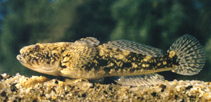| Family: |
Gobiidae (Gobies), subfamily: Gobiinae |
| Max. size: |
22 cm TL (male/unsexed) |
| Environment: |
benthopelagic; freshwater; brackish |
| Distribution: |
Europe and Asia: Danube delta (Braila, Lake Brates); Lakes Kagul, Yalpukh, Katlabukh, Kitai. Dniester from the liman to the region of Kamentes-Podol'sk. Dnieper to Dnepropetrovsk; Odessa and all coasts of the Caspian Sea; and Volga at Astrakhan. Absent from the Sea of Azov. In Ref. 92840, it reported that this species reached the North Sea basin through an artificial waterway connecting the Danube with the Rhine (well-documented) and within 4 years, the species colonized all suitable riverhabitats downstream of the invasion site. |
| Diagnosis: |
This species is distinguished from related species in the Black Sea basin by the following characters: 75-95 % of distance between its origin and anus; ctenoid scales completely cover predorsal area and nape; pelvic disc fraenum with angular lobes, fraenum length 1/6-1/2 of its width at base; scales in midlateral series 68-72 + 3-4; snout length 1.5-2.0 times in eye diameter; first branched ray of second dorsal about as long as penultimate ray; posterior part of first dorsal without black spot (Ref. 59043). |
| Biology: |
Usually in freshwater and brackish water with very low salinity (< 2 ppt); in lower rivers and lagoons, lakes, large rivers, harbours on rocky or well-vegetated bottom (reed thickets) in still waters as well as rapids. Initial spawning at 2 years, in March to May, where adhesive eggs are deposited on stones, shells and aquatic plants; while males guard the eggs until hatching. (Ref. 59043). Feeds on crustaceans (mysids, corophiid amphipods) and small fish (gobies) (Ref. 4696). |
| IUCN Red List Status: |
Least Concern (LC); Date assessed: 05 March 2010 Ref. (130435)
|
| Threat to humans: |
harmless |
Source and more info: www.fishbase.org. For personal, classroom, and other internal use only. Not for publication.
